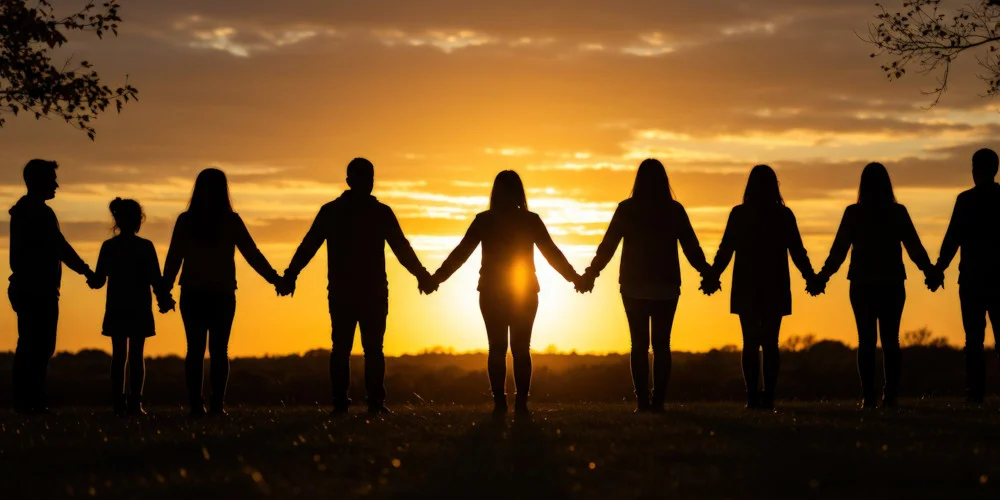Families in Recovery, When Healing Means Letting Go

When someone you love gets sober, you think it’s over. You imagine relief, the chaos is gone, the fear is gone, the drinking or using has stopped. You finally get to breathe again. But what no one prepares you for is the truth, recovery doesn’t just belong to the addict. It belongs to everyone who was hurt, controlled, or exhausted by the disease.
Families don’t walk away from addiction untouched. They carry their own scars, the sleepless nights, the lies, the manipulation, the financial strain, the emotional whiplash. And when the addict starts to heal, families are often left holding a mess of feelings, hope, anger, confusion, and fear of what comes next.
Addiction may have ended, but the habits it created, mistrust, codependence, guilt, remain. Real recovery means the family has to heal too. And sometimes, that healing begins with something most people don’t expect, letting go.
The Myth of “We’re Fine Now”
It’s easy to believe that sobriety fixes everything. The drinking stops, the chaos fades, and everyone expects life to return to normal. But the truth is, there is no “normal” to go back to, that version of your family doesn’t exist anymore. Addiction changes everything. Roles shift. Boundaries blur. The family system adapts around the addiction in ways that no one even notices until it’s over. Maybe one person became the caretaker, another the peacekeeper, another the scapegoat. Everyone developed survival roles to keep the household functional in dysfunction.
When sobriety enters the picture, those roles don’t disappear overnight. The caretaker still worries. The peacekeeper still avoids conflict. The addict may feel smothered by help they no longer need. What looks like healing from the outside often feels like imbalance inside.
That’s why families in recovery need their own kind of rehab, a process of unlearning, rebuilding, and redefining what healthy connection looks like.
Love Isn’t Always Help
One of the hardest truths for families to accept is that love, on its own, can make things worse. When you’ve watched someone you care about destroy themselves, every instinct screams to protect them, to fix, to guide, to rescue. But that same love can easily slide into control.
You hide the bottles. You track their movements. You monitor their moods, finances, and friends. You live on high alert, waiting for relapse. It feels like care, but it’s really fear. This constant state of surveillance doesn’t help recovery, it smothers it. It keeps the addict trapped in the same dynamic where someone else manages their life. It also keeps the family locked in anxiety, unable to trust or rest.
Loving someone in recovery means letting them take responsibility for themselves, even if that means watching them struggle. It’s the hardest form of love there is, the kind that steps back instead of stepping in.
The Weight of Codependence
Addiction breeds codependence, a relationship where one person’s chaos defines everyone else’s peace. Families become addicted to control, to fixing, to being needed. When the addict recovers, the codependent feels lost.
It’s disorienting when the crisis ends. You’ve spent years reacting to someone else’s behaviour, and now there’s space, too much space. Many family members describe feeling restless or even angry during early recovery. They finally have time to think, and what surfaces is grief.
Codependence often masks pain. It’s easier to focus on someone else’s drinking than to look at your own exhaustion, resentment, or fear. But healing from addiction means learning to redirect that energy inward, to nurture your own life again.
You can’t save someone else without saving yourself first.
The Guilt That Keeps Families Stuck
Almost every parent, partner, or sibling of an addict carries guilt. You replay every argument, every missed sign, every moment you didn’t stop it. You wonder if you caused it, or if you could have prevented it. Addiction thrives in that guilt. It keeps families compliant, afraid to set boundaries, afraid to say no. But here’s the truth, you didn’t cause it, you couldn’t control it, and you can’t cure it.
The sooner that truth sinks in, the freer everyone becomes. Guilt doesn’t help recovery, honesty does. And honesty means admitting you’re tired, hurt, and human. You don’t have to be the hero. You just have to be real.
When Healing Means Letting Go
Letting go isn’t abandoning someone. It’s giving them the dignity of choice, even if you hate the choices they make. It means trusting that they’re capable of their own recovery, and that your job is not to carry them, but to support them.
Letting go also means releasing your own need for control. It’s about loosening the grip on the past, the resentment, the what-ifs, the “I’ll be happy when they’re better.” Because recovery isn’t about waiting for someone else to change. It’s about changing how you relate to them.
For many families, letting go is also about grief, grieving the years lost to addiction, the dreams that didn’t happen, the version of your loved one that may never return. That grief is valid. It’s not disloyal. It’s part of acceptance.
You can love someone deeply and still decide not to be consumed by their pain.
The Family’s Own Recovery
In the same way that an addict needs treatment, families need their own recovery process. That means therapy, education, and sometimes group support like Al-Anon or family counselling. These spaces help you understand how addiction rewires not just the addict’s brain, but the family’s dynamics. They help you recognise patterns, enabling, rescuing, emotional neglect, and start building healthier ones.
Family recovery isn’t about blame, it’s about awareness. It’s about shifting from reacting to responding. From controlling to communicating. From surviving to living again.
The healthier the family becomes, the less fertile the ground for relapse.
The Emotional Hangover After Addiction
When the crisis ends, emotions you’ve avoided for years rise to the surface. Anger at the lies. Sadness for the lost years. Fear of relapse. Hope that feels fragile. These feelings are overwhelming, especially after years of suppression.
Many families mistake these emotions for dysfunction. They think they’re supposed to feel happy now that the addict is sober. But this discomfort isn’t failure, it’s part of healing. You’re finally feeling what addiction numbed. It’s okay to admit that you’re angry or scared. It’s okay to take space. It’s okay to not rush forgiveness. Healing takes time, and families deserve that time as much as the recovering addict does.
Boundaries Are Love
Boundaries are often misunderstood as cold or selfish, but in recovery they’re essential. They define where you end and the other person begins. They say: “I love you, but I won’t destroy myself trying to save you.”
Healthy boundaries might look like:
- Refusing to lie for someone.
- Saying no to lending money.
- Leaving the room when someone becomes verbally abusive.
- Taking time for your own therapy instead of managing theirs.
Boundaries aren’t about control, they’re about self-respect. They allow you to show love without losing yourself. When families hold healthy boundaries, they stop participating in the addiction, and start participating in recovery.
Rebuilding Trust Without Fear
Trust after addiction is complicated. It can’t be rushed or forced. You want to believe the promises, but part of you still braces for disappointment. That’s normal. Trust isn’t rebuilt with words; it’s rebuilt with time and consistency.
The key is balance, staying open enough to see progress, but grounded enough to protect yourself if old patterns return. In family recovery, it’s okay to say, “I believe in your recovery, but I also need to see it.” Love and accountability aren’t opposites, they’re partners.
Trust will return, not in one big moment, but through hundreds of small ones, the missed call that isn’t a crisis, the calm weekend that doesn’t end in chaos, the dinner that feels like peace instead of performance.
When Families Don’t Heal
Not every family recovers together. Sometimes, even after the addict gets well, the family can’t move past the resentment or damage. Some relationships never return, and that’s painful, but sometimes necessary.
Addiction destroys trust, and not everyone can rebuild it. In those cases, healing may mean accepting distance. Forgiveness doesn’t always mean reconnection. You can wish someone well from afar.
The goal of recovery, for both addicts and families, isn’t to erase the past, but to stop living in it.
The Freedom That Comes with Letting Go
Letting go doesn’t mean indifference. It means peace. It means choosing to stop being held hostage by someone else’s journey. It means recognising that your worth isn’t measured by how much you sacrifice. When families let go, they create space, for healing, for boundaries, for hope that isn’t based on control.
Addiction breaks connection through chaos. Recovery rebuilds it through honesty. But real connection can only exist between people who are free, free to make choices, free to grow, free to live without fear. Letting go is what makes that freedom possible. It’s not giving up on someone. It’s finally giving yourself permission to live again.
And sometimes, that’s the only way both of you truly recover.





